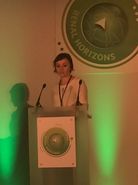Meeting
2023 ASCO Annual Meeting

Gustave Roussy Cancer Campus, Villejuif, France
Lisa Derosa , Carolina Alves Costa Silva , Valerio Iebba , Bertrand Routy , Anna Reni , Clarisse Audigier-Valette , Gerard Zalcman , Julien Mazieres , Sylvie Friard , François Goldwasser , Denis Lucien MORO SIBILOT , Arnaud Scherpereel , Herve Pegliasco , Stéphanie Martinez , Bernard Escudier , David Planchard , Laurence Albiges , Benjamin Besse , Fabrice Barlesi , Laurence Zitvogel
Background: Accumulating evidence pointed to the impact of the intestinal microbiota on ICI outcomes across various cancers. Although specific gut microbial species have been associated with beneficial responses (i.e. Akkermansiamuciniphila (Akk)), no consensus exists on a gut fingerprint predicting immunoresistance to clinical routine use. Methods: NCT04567446 provided whole genome sequencing (WGS) of longitudinal fecal samples from patients (pts) with advanced non-small cell lung cancer (NSCLC) during ICI (alone or with chemotherapy) in France and Canada. Topological Pearson networks clustered into species interacting groups (SIG) correlating with overall survival (OS; OS<12=NR; OS>12=R). Forty harmful (SIG1) and thirty-four beneficial (SIG2) WGS species were associated with NR and R to ICI. A monodimensional score (TOPOSCORE) based on SIG1/SIG2 ratio combined with Akk relative abundance was calculated and compared to machine-learning (ML) algorithms. Multivariate Cox analysis (MVA) adjusted for established risk factors (ATB, gender, age, ECOG, PD-L1, LIPI score). Intraindividual dynamics of the TOPOSCORE was evaluated in pts with at least two fecal samples. Three independent cohorts of NSCLC and genitourinary (GU) cancers pts validated the data. Results: In n=245 and n=148 NSCLC pts, we could classify pts into dysbiotic (SIG1+,33%) and eubiotic (SIG2+, 67%), using the TOPOSCORE. Pts falling within the SIG2+ exhibited a significantly prolonged OS than pts falling into SIG1+ (HR: (95% CI), 0.50 (0.36-0.71), p<0.0001). TOPOSCORE also predicted OS in 277 ICI-treated NSCLC and GU pts and compared to the state-of-the-art ML algorithms, held the highest percentage of correct predictions (63%). At MVA, TOPOSCORE was independently associated with OS (HR: 0.56 (0.39-0.81), p=0.002). Analyzing the intraindividual dynamics of the TOPOSCORE (n=67), we found that 74% of SIG2+ and 68% of SIG1+ individuals remained in their initial classification during ICI treatment. We finally scaled the calculation of the TOPOSCORE down to 24WGS (instead 75WGS) and set up a qPCR-based friendly-user test capable of accurately identifying the fecal presence of the bacteria of interest within 48 hrs. We confirmed (n=323) that OS was superior in those pts harboring a 24-bacteria-qPCR-based TOPOSCORE falling within the SIG2+ category (HR: 0.65 (0.48 to 0.87), p=0.0005). Conclusions: TOPOSCORE represents a robust biomarker predicting and following the dynamic of the immunoresistance to ICI across cancers on an individual basis. By converting the WGS TOPOSCORE to a qPCR-based test with a rapid turnaround time, it will be possible to adopt this score in routine clinical practice to improve pts stratification and ICI success rates guiding the selection of dysbiotic pts amenable to microbiota-centered interventions and eubiotic fecal microbiota transplantation donors. Clinical trial information: NCT04567446.
Disclaimer
This material on this page is ©2024 American Society of Clinical Oncology, all rights reserved. Licensing available upon request. For more information, please contact licensing@asco.org
2023 ASCO Annual Meeting
Clinical Science Symposium
Role of the Microbiome in Immune Checkpoint Inhibitor Response and Resistance
Special Sessions
New Targets and New Technologies (IO)
NCT04567446
J Clin Oncol 41, 2023 (suppl 16; abstr 103)
10.1200/JCO.2023.41.16_suppl.103
103
Abstract Disclosures
2023 ASCO Annual Meeting
First Author: Nuria Mederos
2022 ASCO Annual Meeting
First Author: Erica C. Nakajima
2023 ASCO Annual Meeting
First Author: George R. Simon
2023 ASCO Annual Meeting
First Author: Mao Uematsu